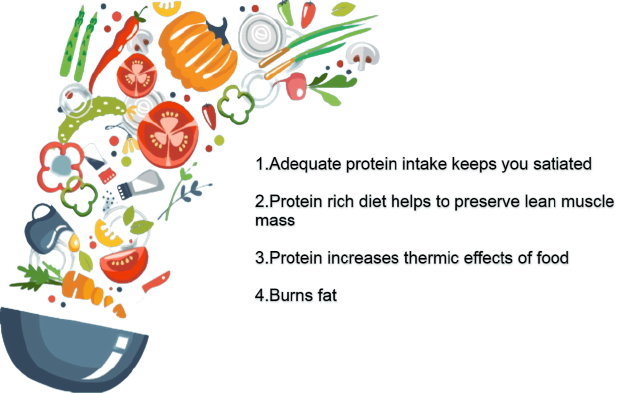Importance of Protein in Weight Loss
- Dr.P.Praveen Raj
- Mar 28,2023
- 01:00 pm

Obesity is a metabolic disease that has reached epidemic proportions. The world health organization (WHO) has declared obesity as the largest global chronic health problem in adults. There are many different weight-related diseases and health conditions that can affect your body. Some of these diseases and health conditions include
- Sleep Apnea
- High blood pressure
- Diabetes
- Cancer
- Heart disease
- Stroke
- Osteoarthritis and other negative health conditions.
Losing weight is one of the easiest ways to improve your health.
There are numerous dietary strategies for weight loss that work in the short term. Restricting one dietary component is not effective for long-term weight loss and the main mechanism by which weight loss is attained is by decreased caloric intake. The ultimate benefit of a weight loss diet is judged by its long-term effects on body weight & general health.
During dietary treatment, the goal of weight management is to decrease body fat stores and preserving the lean body mass. The combination of exercise, both cardiovascular & resistance training, and adequate dietary protein intake (1 g / kg current body weight for those who are having normal BMI, 1 g / kg ideal body weight for those who are obese ) is the way forward
Why weight loss efforts often fail?
When you are trying to lose weight, you are not fighting against cravings alone. You have to deal with your own body too as it may start to resist the change you are making. When people are on a weight loss diet, they instinctively believe that they can lose weight by reducing the amount of food they eat; as a result the amount of protein in their diet will also became insufficient to meet their daily requirement. Instead of reducing the quantity of food, replacing the wrong food choices with the right food choices is the better option. Replacing Carbs & fats with protein is an ideal strategy for weight loss. Adequate protein intake is strongly interconnected with weight loss as well as weight maintenance strategies.
Adequate protein intake keeps you satiated
Food cravings are one of the most common reasons why people struggle to lose weight and keep it off. High protein diet reduces hunger, helping you to eat fewer calories & reduce cravings. Protein has shown to be more satiating than carbohydrate and fat in the short term & long term.
Protein rich diet helps to preserve lean muscle mass
Dietary proteins target fat mass loss during the weight loss process rather than muscle mass loss. Including protein-rich foods in your diet helps to reduce visceral fat contributing to obesity & other health problems. Protein is the building block of your muscle. Eating an adequate amount of protein helps to maintain muscle mass & promotes muscle growth.
Protein increases thermic effects of food
in order to digest your meal, your body needs time to break it down & transform it into energy. The expense of breaking down of food is drastically high in protein
Burns fat
since protein has a higher thermic effect, it will take more energy to breakdown, as compared to fats & carbs, thus high protein diet can help in burning more calories as it makes the body work harder for digestion, and has a higher potential to burn fat.
Eating a balanced diet with adequate protein intake is the long-term solution for weight loss. Increasing your protein consumption will make you feel fuller & increase your satiety.
One of the surprising facts about high protein diet is, it can regulate hunger hormones. Yes,eating protein reduces your appetite. This can help you to take in fewer calories while boosting your metabolism to burn more calories. Including high biological value protein based foods such as egg white, chicken, fish etc will induce satiating hormones which can help to control appetite & food consumption.
if you want to lose weight, in an appropriate way, you have to set a goal to eat a certain amount of protein per day based on your daily requirement. About a third of your calories should come from protein-based food for weight loss. The right recommendation of protein for you per day will largely depend on your level of activity, age, muscle mass and overall health. Protein recommendation for each individual is planned only after nutritional assessment.
Eat Healthy Be Healthy

